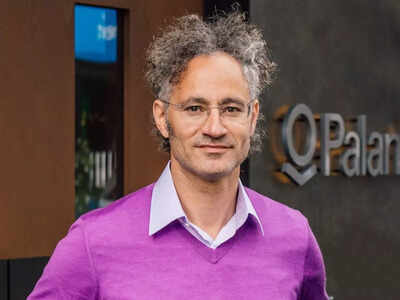ARTICLE AD BOX

When Alex Karp, CEO of software company Palantir Technologies, spoke during the company’s recent earnings call, he made a pointed remark that might resonate with students and early-career professionals alike.
Karp said that degrees from top institutions like Harvard, Princeton, or Yale no longer carry weight once someone joins the company.“If you did not go to school, or you went to a school that’s not that great, or you went to Harvard or Princeton or Yale, once you come to Palantir, you're a Palantirian. No one cares about the other stuff,” he said, pushing back against the long-held assumption that elite credentials guarantee success in the workplace.Founded in 2003, Palantir builds data platforms used by institutions across sectors. But beyond the tech and contracts, what stood out this time was the CEO's clear stance on educational backgrounds.
Degrees don’t define performance
Karp said the company is working towards building what he described as a "new credential" that focuses on work done at the company, rather than the institution someone attended. The approach reflects a shift some employers are beginning to adopt, evaluating candidates based on skills and performance rather than academic pedigree.
“We are making a new credential independent of class and background at Palantir,” he added.According to Karp, this shift is not just philosophical. He noted that some employees without college degrees are contributing at levels equal to or greater than their peers with formal education. “People with less than a college education are creating a lot of value, and sometimes more value than people with a college education, using our product,” he said.
From campus to workplace: A stark transition
Karp also drew a contrast between academic settings and professional expectations. He said many new hires arrive from universities where they have mostly “been engaged in platitudes,” and described the work environment at the company as very different from anything they’ve experienced before.“We're asking people to work in an environment, when they come in here, that is very different than anything they've ever worked on,” he said.While many companies still list degrees from top universities as desirable in job postings, some are rethinking that approach. Several large firms have already begun focusing on demonstrable skills, certifications, or hands-on experience.
A broader conversation about credentials
Karp’s comments contribute to an ongoing debate about the value of a college degree in today’s job market. More employers are revisiting what qualifies as “job-ready.” Micro-credentials, open-source contributions, and real-world project portfolios are gaining relevance in hiring conversations.His assertion that “this is by far the best credential in tech” may not resonate with everyone, but it signals a wider shift. In some corners of the industry, where you studied is less important than how you contribute once hired.Karp also told CNBC’s Morgan Brennan that the company aims to scale revenue significantly while reducing headcount. “We’re planning to grow our revenue … while decreasing our number of people.
This is a crazy, efficient revolution. The goal is to get 10x revenue and have 3,600 people. We have now 4,100,” he said.
What students and professionals should keep in mind
For those navigating college admissions or early career decisions, these remarks come at a time when the return on investment in traditional education is being re-evaluated. While degrees from institutions like Harvard, Princeton, or Yale continue to carry weight in many fields, the shift in hiring language across some parts of the tech sector suggests they are no longer the only pathway to opportunity.Performance, adaptability, and the ability to work in ambiguous and evolving environments are increasingly valued. For students, this may mean building projects beyond the classroom. For professionals, it may involve upskilling or pivoting to roles where skills speak louder than titles.Not every company shares the same outlook, but the conversation has clearly moved. What matters most is no longer just where you studied, but how you show up when it counts.TOI Education is on WhatsApp now. Follow us here.



.png)
.png)
.png)
















 2 hours ago
3
2 hours ago
3









 English (US) ·
English (US) ·